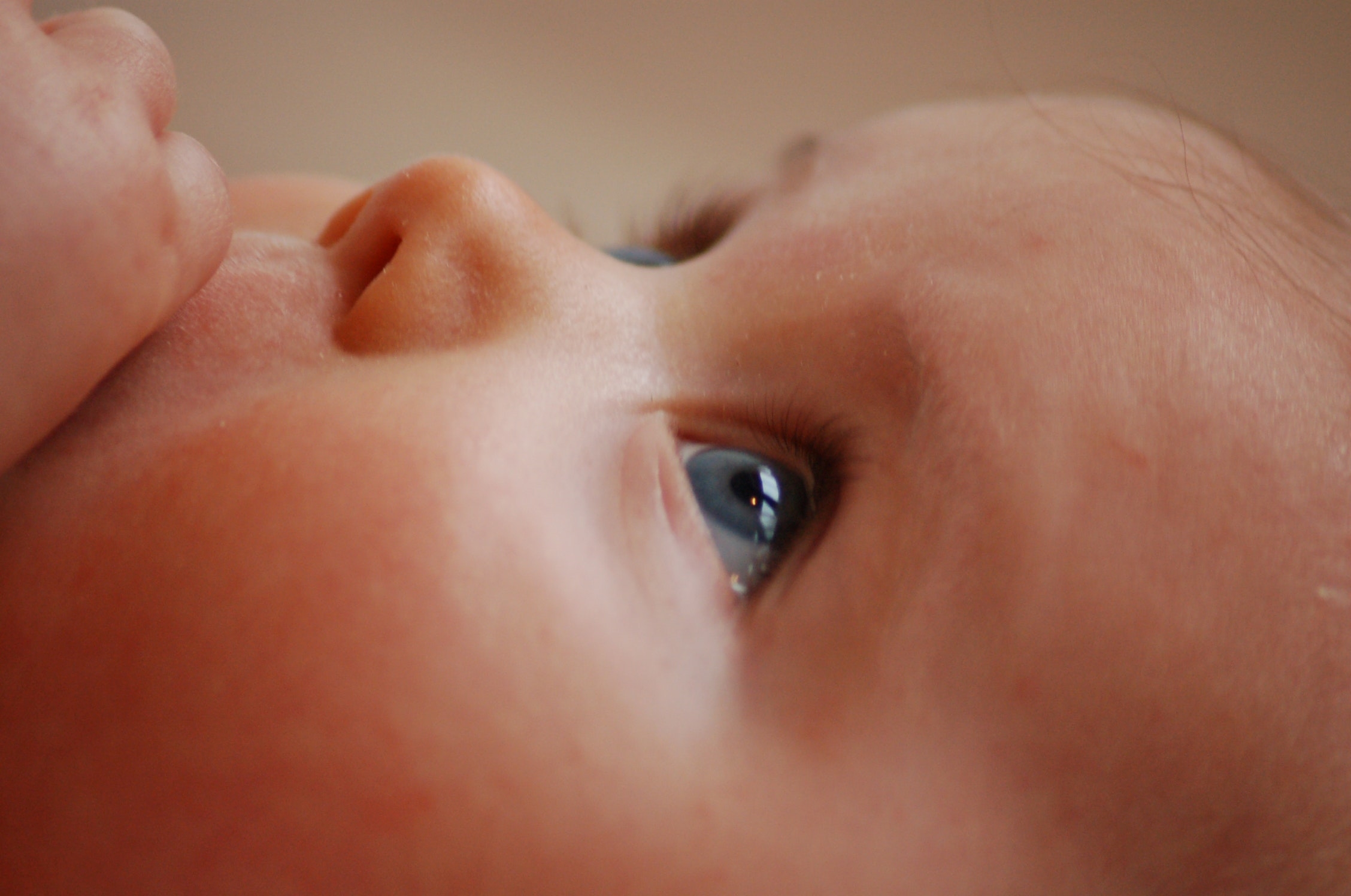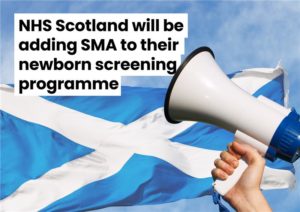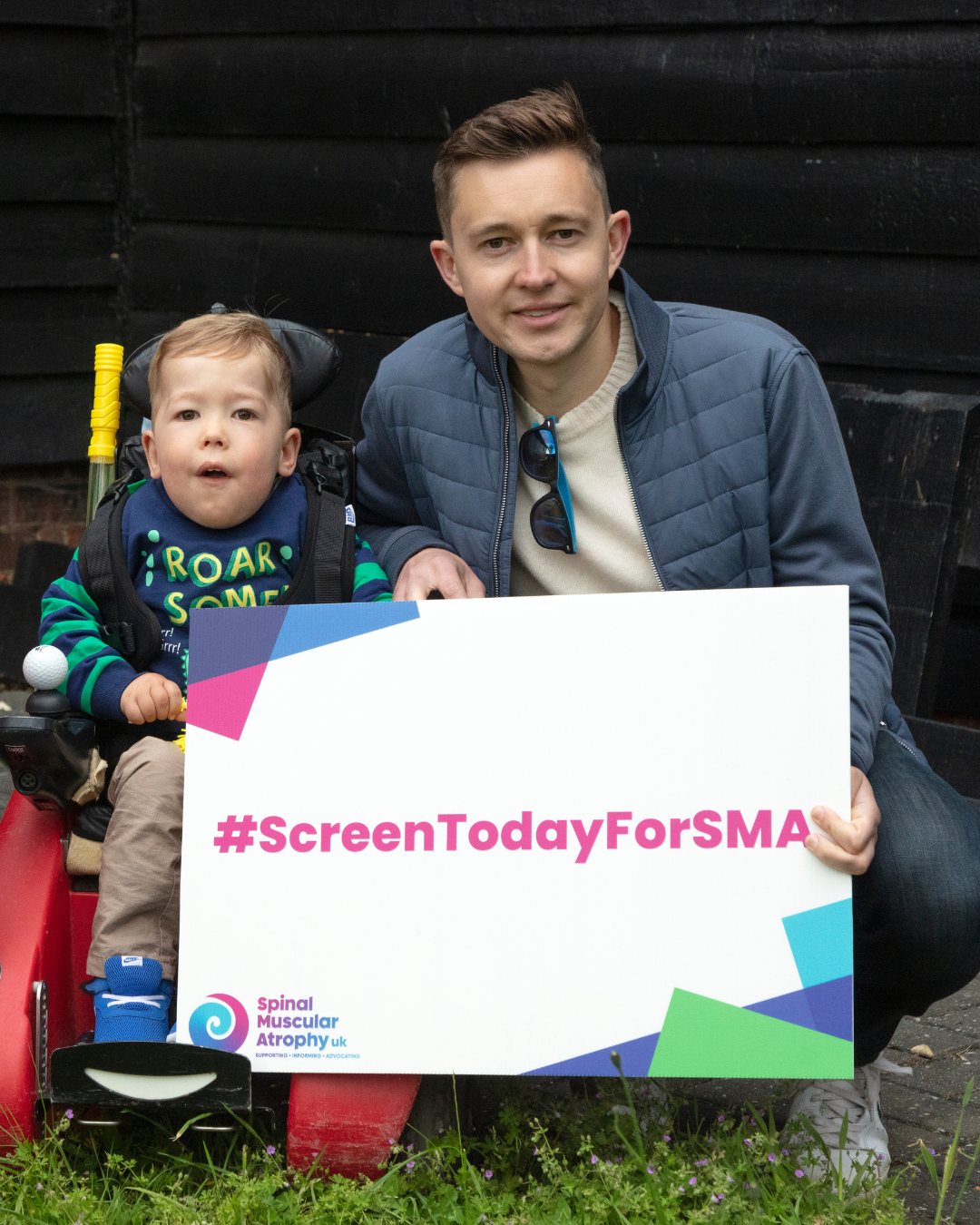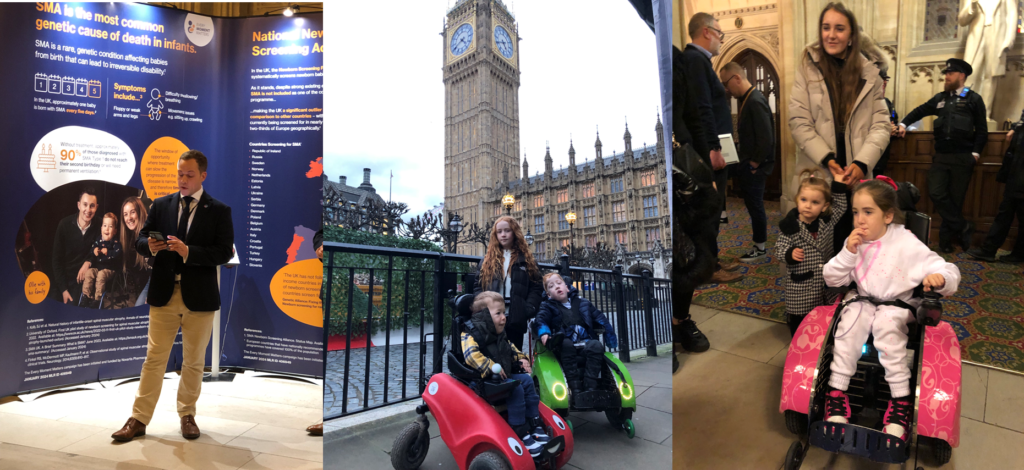Newborn Screening for SMA

Newborn Screening for SMA
There is clear evidence that early diagnosis and treatment of SMA leads to better outcomes. Early detection of the condition is critical.
The NHS offers newborn blood spot screening (using a heel prick to take blood) when a baby is 5 days old. It currently looks for 9 rare but serious conditions. This does not currently include SMA.
We report on how shockingly far behind the UK is in introducing NBS for SMA. We inform you about plans to change this. We keep you updated on progress and our advocacy work.

NHS Scotland will be adding SMA to their newborn screening programme in an evaluative and research capacity with the aim of the first baby being tested in early 2026.
Read more here
Last updated: 27th July 2025
Watch all the latest news stories highlighting the need for newborn screening.
 SMA UK worked closely in collaboration with Havas Life London, to produce a short film emphasising the urgent need for Spinal Muscular Atrophy (SMA) to be included to the UK Newborn Screening (NBS) programme.
SMA UK worked closely in collaboration with Havas Life London, to produce a short film emphasising the urgent need for Spinal Muscular Atrophy (SMA) to be included to the UK Newborn Screening (NBS) programme.
Watch this emotive short film where 4-year-old Ollie shares the things he’ll never get to do because SMA wasn’t included in the newborn screening test when he was born. SMA is rare and irreversible, but early diagnosis and treatment can change everything.
Last updated: May 2025
Founded in 2020, the UK SMA Newborn Screening Alliance brought together a group of expert clinicians, academics and patient organisations dedicated to securing the earliest possible introduction of newborn screening (NBS) for SMA in the UK.
Chaired by Professor Laurent Servais, Professor of Paediatric Neuromuscular Diseases at the MDUK Oxford Neuromuscular Centre, it comprises leading SMA experts in the clinical and academic community and patient organisations, including Spinal Muscular Atrophy UK and Muscular Dystrophy UK.
Objectives
In 2018, the UK National Screening Committee (UK NSC) decided not to recommend adding SMA to the national screening programme. The Alliance is focused on the following objectives:
- Contribute to the development of evidence on NBS for SMA and provide expert input to the UK National Screening Committee
- Identify opportunities and advocate for an accelerated recommendation on SMA NBS
- Ensure that the wider SMA community is informed about progress towards introducing NBS and has the opportunity to support and be involved in advocacy
- Support wider efforts by the rare disease community to improve the UK process for expanding newborn bloodspot screening so that more children born with rare diseases are able to benefit from earlier diagnosis and treatment
SMA UK and MDUK jointly secured funding for this work from Novartis and Roche as well as contributing their own funds. This included funding Alice Fabre in the the part time post of Project Manager. Alice has tirelessly driven the Alliance’s work since 2023.
Funding has now ended but Alliance members continue to pursue its objectives. Many are now taking part in the ISE/SMA Partnership sub-groups and Board.
Last updated February 2025
On February 7th 2025, the prestigious scientific magazine ‘The Lancet’ published a letter authored by leading SMA clinicians, Laurent Servais, Tamara Dangouloff, Francesco Muntoni, Mariacristina Scoto and Giovanni Baranello: Spinal muscular atrophy in the UK: the human toll of slow decisions >
The letter highlights the ‘substantially different outcomes for children born in the UK compared with those born in many other countries where newborn screening is available’. The authors powerfully describe some shocking statistics on the differences seen in the outcomes for babies born with SMA type 1 in the UK when compared to those in Europe, who are being diagnosed and treated through newborn screening.
They explain how in the UK, babies born with SMA, treated after symptoms start, are still dying. Of those born with SMA type 1 who live, non can walk and the majority are reliant on ventilatory support and tube feeding. Comparatively, in Belgium, babies diagnosed and treated through newborn screening all survived, all are ambulant, and none are reliant on ventilatory or nutritional support.
The ‘real-world’ research paper published on 8th April 2024 also confirmed the Clinical Effectiveness of Newborn Screening for SMA >.
For the latest update on screening programmes in Europe see the European SMA NBS Alliance Status Map >
Last updated March 2025
The UK National Screening Committee (NSC) is responsible for assessing the evidence for all national screening programmes. It recommends which conditions should be screened for.
What is it for?
An ISE is similar to a pilot study. It aims to:
- screen a percentage of babies born in the UK for SMA over a set period of time
- help the UK NSC develop UK specific evidence on newborn screening for SMA
- inform the NSC how newborn screening for SMA might work in a UK setting.
- inform the NSC’s final recommendation on whether to recommend that SMA is added to the UK newborn screening programme and heel prick test.
How is the planning for it being done?
In preparation for the roll-out of the ISE, the UK NSC have established several sub-groups. These focus on different aspects of the ISE delivery. They include:
- the laboratory sub-group – confirming the processes that will need to be set up in UK blood test laboratories
- the clinical pathway sub-group – establishing the fastest possible timeline between an ‘SMA suspected’ test result, its confirmation and the start of treatment. This has set up a task and finish group. It is developing information for parents and information and training for health professionals inviting parents to have their baby screened
- the data and methodology sub-group – ensuring that the ISE design will meet the overall NSC objectives.
The sub-groups report to the overarching ISE/SMA Partnership Board. Its members represent the many groups and stakeholders involved in developing this complex evaluation.
How will the ISE results be recorded and reported?
An independent academic research group (IRG) must be selected before the ISE is rolled out. It must approve the design of the ISE. The IRG then monitors and collects the answers to the questions the UK National Screening Committee (NSC) has about future NBS for SMA.
The National Institute for Health and Care Research (NIHR) has been developing the brief for this independent research study. They have been taking part in the ISE planning meetings so that they understand the complexities of running this programme and hear the advice of the clinical, patient and other experts.
Last updated: 11th August 2025
We had been advised that the NIHR was likely to advertise the brief of the study in late summer 2024. This was delayed by questions raised by the Department of Health and Social Care (DHSC) which has to approve such studies. The NIHR finally released its invitation to researchers to apply on 28th May 2025. Closing date for applications is 24th September 2025.
In autumn 2024, the laboratory group reported that it would be possible to aim to begin screening for SMA in the ISE in mid or late 2025. This was provided that the 6 labs which currently test blood spot samples for SCID by an appropriate method are used. This possible start date is clearly not going to happen.
At this time, NHS England said that the 2025 timescales were challenging given current resource constraints, but confirmed there is high level NHSE commitment to the project.
The change in Government brought with it a major spending review of all NHS commitments. The ISE has been caught up in this. The ISE/SMA Partnership Board and all those involved are doing all they can to obtain a green light for it to go ahead as planned. Time is slipping away with all that this means for babies born with SMA in the UK.
The ISE/SMA Partnership issues regular blogs reporting on this work. You can read the most recent one:
7th August 2025: UK NSC publishes SMA screening evidence documents >
Last updated: 9th July 2025
Expanding population screening for genetic and rare conditions is a key part of our five-year strategy. While many countries now screen for over 20 conditions, only nine conditions are included in the UK’s NHS Newborn Blood Spot Screening Programme. There is growing consensus from across the rare community and Genetic Alliance UK’s broader network of stakeholders that this needs to change.
The report explores how the UK National Screening Committee (UK NSC) can accelerate its approach to decision-making for expanding newborn screening, drawing on research findings from 14 countries to identify practical, evidence-informed steps for improving the way decisions are made in the UK. It also considers the role of genomic newborn screening.
The report calls on governments and health system leaders to:
- adopt a pragmatic approach to evaluating evidence for genetic and rare conditions
- strengthen the involvement of patient organisations in decision-making
- ensure greater transparency in decision-making
- introduce more agile review processes to promote readiness for new screening technologies, including whole genome sequencing
- commit to a long-term plan for broader health systems innovation, including readiness for new therapies.
Last updated: March 2025
Amelia
My name is Amelia. I am 16 years old and I have had SMA type 2 all my life. My sister Lena has SMA too, but she was diagnosed at birth and has had a gene therapy which hopefully will prevent the progression of the disease.
Portia and Ezra
Portia’s son, Ezra has SMA type 1. Their journey highlights the importance of new born screening and how it could transform the lives of those living with SMA in the future. This short film, made when Ezra was aged 5 years, was part of Rare Disease Day 2022 when Genetic Alliance UK partnered with ITN to produce ‘Shining a Light on Rare Conditions’, a news-style programme raising awareness of people affected by rare, genetic, and undiagnosed conditions.
Eden
Eden, who has SMA Type 3, and her mum describe more about how the condition affects Eden, their experience of diagnosis, and how newborn screening could change the lives of others like theirs:
Teddy
Neil talks about the short time his family had with their son Teddy who had SMA Type 1, and why he supports pre-symptomatic screening and treatment for SMA.
Ollie
Ben describes his family’s journey to diagnosis and treatment for son Ollie who has SMA Type 1 and the difference pre-symptomatic screening and treatment would make.
We encourage you to raise awareness of the compelling arguments presented in the Lancet letter, as well as the significant delays in getting the ISE underway. Please take action by contacting your local Member of Parliament (MP).
Instructions:
1. Download the template letter >
2. Personalise the letter by replacing the red text with your own story and details.
3. Find your local MP by entering your postcode >
4. Select your MP from the list.
5. Copy and paste your personalised letter into the submission box.
6. Add your contact details.
7. Preview your letter and send it.
After sending, kindly let us know by sending a WhatsApp message to: 07483 070304 or email portia.thorman@smauk.org.uk with the following: “I have contacted my MP, [Your Name], [Your Postcode].”
Last updated: March 2025
This research study took place in 2022/24 to see if newborns in the UK can be screened for SMA and therefore start treatment before symptoms develop. By the end of October 2024, the study had recruited 32,274 participants.
All screening results are now completed and the study findings are being collated. They will help with the National Screening Committee’s decision on whether to include SMA as part of the standard UK Newborn Screening.
More information about the study >
Timeline of Key Advocacy Work for NBS for SMA
5th- 9th February: Every Moment Matters Westminster Hall Exhibition
Catching the eye of the Westminster Hall Advisory Group, the Every Moment Matters report was featured in a Westminster Hall Exhibition. Westminster Hall is a thoroughfare for all MPs and Ministers working in the Houses of Parliament, so it was a fantastic opportunity to raise awareness of the desperate need to speed up the decision to implement newborn screening for SMA in the UK.
SMA UK’s CEO Giles Lomax, and the families living with SMA who were featured in the report attended the opening ceremony, and met with MPs, introducing them to the children living with SMA and sharing their stories.

8th November: Every Moment Matters campaign report launched
Every Moment Matters: Implementing newborn screening for Spinal Muscular Atrophy in the UK
This policy report was launched today at a parliamentary roundtable meeting sponsored by Liz Twist (Labour MP for Blaydon and Chair of the All-Party Parliamentary Group for Rare, Genetic and Undiagnosed Conditions). The report was informed by input from experts across the SMA and rare disease community. It was commissioned by Novartis Pharmaceuticals and supported by SMA UK.
The report explores the opportunities for supporting the best possible outcomes for all those affected by SMA, and how doing so can contribute to the UK’s wider rare disease and life science ambitions.
SMA UK, coordinated the collection of several family case studies for the report. These show the impact late diagnosis and treatment has on the lives of children living with SMA and their families. There is also a statement included from SMA UK’s CEO Giles Lomax.
Today’s meeting was attended by a number of families from the SMA Community; it was opened by Giles. There were presentations from expert speakers who spoke about the current clinical pathway for people with SMA; and progress that has been made to date towards the introduction of newborn screening. There was a group discussion, where attendees shared their perspectives on how the SMA, and rare disease community, can support the urgent introduction and implementation of newborn screening for SMA across the UK.
4th August:
In-Service Evaluation Planned for NBS >
June – August
Petition to introduce NBS in the UK gained 11,718 signatories. The Government responded and confirmed that this work will take place in 2021/22.
26th March
European Newborn Screening Alliance launches Whitepaper on the need for NBS programmes to include SMA.
31st August
SMA Europe and Partners launch The European Alliance for NBS >
14th February
SMA Experts recommend newborns who have 2, 3 or 4 SMN2 copies should have immediate access to treatment >
2020: The UK Newborn Screening Alliance is formed
23rd July:
Genetic Alliance UK launches ‘Fixing the Present, Building the Future – NBS for Rare Conditions’. SMA UK was a participant in the workshop that led to this report.
18th February:
UK National Screening Committee does not recommend carrier or NBS for SMA >
SMA UK supports Dr Felicity Boardman’s ‘Imagining Futures’ Research into views of NBS for SMA held by people affected by SMA. There are 337 respondents and 36 in depth interviews.
Imagining Futures – ongoing work
